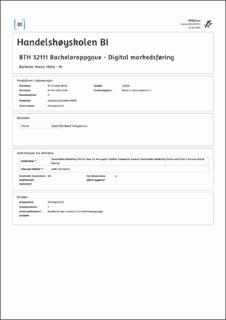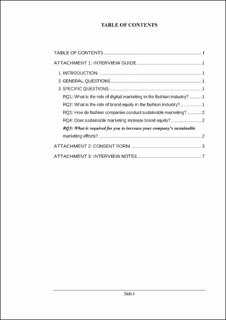| dc.description.abstract | It is not secret that the fashion industry is widely believed to be unsustainable. In fact, the industry was responsible for 10% of global emissions in 2017. Furthermore, the fashion is thought to be the second most polluting industries by the UN per 2019. At the same time, consumers in the markets are interested in fashion for longer parts of their lives, leading to exponential growth in the market of and belonging demand for fashion. There is little evidence that suggests a shift in these developments any time soon. As it pertains to the relationship between marketing and sustainability, a paradox reiterated by fellow academics highlights the conflict between the traditional view of marketing and sustainability in regard to sustainable consumption. Moreover, studies in the European markets show that marketing is increasingly associated with unsustainability in the form of excessive consumption.
By conducting a qualitative study with an exploratory design, in-depth interviews with the management of four leading fashion companies in Norway were conducted with the intent of answering the overarching research problem of “How do Norwegian fashion companies conduct sustainable marketing online and does the practice increase brand equity?”. To ensure full coverage of the subject area (high validity), a selection of research questions were developed and discussed before arriving at a conclusion.
Briefly summarized, the study found that Norwegian fashion companies conduct sustainable marketing online with an experimental approach. The effects of which are measured through parameters related to brand equity as described in the framework depicted below because the brand is perceived as the most important aspect of their business. Additionally, the study uncovered that the respondents had experienced improvements in these metrics when conducting sustainable marketing, indicating that sustainable marketing does in fact increase brand equity.
With these results, I hope to motivate Norwegian fashion companies to increase their sustainable marketing efforts by presenting documented brand- and economically related incentives for doing so. I also hope to contribute to the academic field of sustainable digital marketing by laying the foundation for
future, quantitative studies to be conducted on the correlation between brand equity and its connection to sustainable marketing.
Key words: Sustainability, Fashion, Digital marketing, Web analytics, Qualitative study, Brand equity | en_US |

